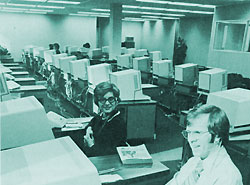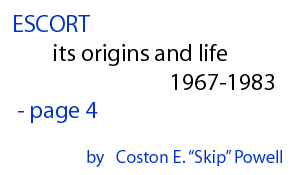 |
|
 |

The demise of ESCORT
Attendant to the late 1985 sale of Republic Airlines, an excruciating detailed analysis was prepared to compare the capabilities of ESCORT and the ‘redtail’ UNIVAC system. The Analysis clearly illustrated end-to-end plusses and minus’s of the two systems. The resulting system would be required to handle 28+ million annual passengers and 30+ million messages per year, at the rate of 150+ messages per second. Required cost estimates were included.
At the time, the largest (NW like) UNIVAC system (changed to Sperry UNISYS in 1986 with the merger of Burroughs) was processing 19 million annual passengers. UNIVAC maximum capacity at that time was just above that number. Some 8 worldwide airlines (7 International) were using UNIVAC, NW being the 2nd largest. Using UNIVAC for the combined RC-NW operation was deemed “very high risk”!
Conversely, 22 airlines were using PARS (the system from which ESCORT was birthed) and IPARS its International brother. Four PARS airlines were already boarding far more passengers then the combined RC-NW total, one by 46%. Further, five airlines were currently successfully handling a “messages-per-second” rate that exceeded the RC-NW requirement - one by 400+%.
RC had 4,000 and NW 5,000 agent terminals installed – a significant investment. ESCORT Programmer LeRoy Rausch, had quickly demonstrated that ESCORT could handle the combined airlines agent terminal networks.
Over 300 functions of the two airlines were illustrated and compared. While very few RC flaws were identified, many showed improved functionality over the NW UNIVAC system.
It was made clear that the ESCORT system had ‘the-horses’ immediately available and that the expanded NW system would not handle the combined airline requirements. Equally clear was that ESCORT, with very few exceptions, had the needed functions – in-place. ESCORT reliability, 365 day 24/7 uptime of 99.8% was not an issue. It was clear that PARS was the ‘standard’ airline system.
In early 1986: ESCORT staff and RC CSS (Computer & Communication Services) management met with NW counterparts to discuss which reservation system to use. Apparently their recommendation was convincing – but not quite adequate to overcome political “views”.
This produced executive public announcement #1, the system of choice for the combined airline would be ESCORT – “preparations for such were put into high-gear”.
But ah, ‘redtail’ passion ruled. A preponderance of their ‘experts’ and Exec’s miss-judged. In mid-May, their 1st decision was renounced. Apparently, no other way to explain it, NW Computer Services management ignored future issues and won the political war (for the time being anyway), convincing corporate executives to reverse themselves. In May 1968, NW Executives reversed their earlier decision via a 2nd public announcement that they had changed their mind. They would retain their in-place UNIVAC system and would convert RC from ESCORT. Further, they announced that, limited ESCORT operation would be continued, because it had important functionality not available in their system, e.g.; RC Aircraft Weight and Balance and the Cash Concentration Systems.
RC conversion to the NW system went very badly; UNIVAC could not match ‘the-passion’ of its management. The conclusions of the 1986 Detailed Analysis comparing the two systems were validated. The UNIVAC system was severely inadequate to handle the tight RC hub-and-spoke flight network.
Less than a year later, a 3rd decision renounced the 2nd decision. NW had purchased an ownership position in, and would convert to the TWA System located in Kansas City, MO. The TWA was named PARS, a sister to ESCORT. Today it remains as a system birthed from IBM’s PARS, as is the DL system.
Such relocation could not have been a simple process. Both ex-RC agents already newly re-trained to use the NW UNIVAC system and NW agents were now required to learn use of the Kansas City system. Work would be required to realign NW agent terminal networks to the TWA system. UNIVAC resident data would require conversion to the TWA PARS data structure and moved to the MKC System.
Having left RC several years prior to the above turmoil, my conclusions are the result of documents prepared during that time and personal anonymous interviews. I later had several opportunities to prepare costing studies to determine the feasibility to replace ‘in-house’ computer processing in favor of it being “out-sourced”. During the late 1980s and 1990s, “out-sourcing” was all the rage and a number of organizations tendered up their computer processing to outside vendors – supposedly a cost based move. I performed several outsourcing studies, once all cost benefits and business impacts were totaled, I could never prove outsourcing was beneficial – except to the vendor.
Now that some 20 years have lapsed and earlier decision makers have ‘moved-on’, it would be most interesting to conduct a post-mortem cost/benefit analysis of the 3rd NW decision versus the 1st. The result would expose to the light-of-day, the merits of each. Such analysis should reflect the more complicated, burdensome, and time consuming coordination required in dealing with an outside remotely located organization. This would be a great project for one working to obtain an advanced Information Technology or Business Administration degree!
“The future isn’t what it used to be”, as said by, Yogi – the master of understatement.
EDITORIAL by Coston E. (aka Skip) Powell
Soon after RC appeared, I could actually feel ‘things’ were not the same, erosions had begun. Too many, ‘non-NC-characteristic’ things were creeping in the ‘back’ door without explanation. Key operational long term department management folks got abruptly hacked, others shuffled about. The long held practice of promotion from within vanished.
Newly hired management “experts” (well, they did have shinny new briefcases) were tainting the air, outside hires knew more than the long NC timers, and they made that clear – tho not via any productive gains. Their mystery activities were un-disclosed. The information pipeline had sputtered dry. Of course, not much later, those ‘experts’ along with too many loyal NC types, were searching for other employment.
This uneasiness of so many sudden changes impacted confidence enjoyed over the previous years. Sadly, the goal of making a good airline greater seemed of lower priority in favor of self gain. In an earlier NC management training class, I was one of many who heard words direct from the lips of President Bud Sweet “Do not worry about your job security. You were chosen for your position from among others. Your concern is job productivity”. That management dictum vanished. Then later, unheard of, NC/RC lost money. Then later, pay cuts or whatever it was called (Thanks to Marv Fritz – we got some back).
Some might utter; “Sour grapes?” Maybe, but I and my NC associates spent their young adult years working at NC, some later with other employers. We now know clearly that our NC years were special. NC management was special, oriented toward running a financially prudent operation and a ‘people’ oriented airline, for both customers and employees. The environment that garnered absolute employee loyalty disappeared, not ever again found. NC was not a job, it was a cherished career – it was ‘our home’, not to be mussed with.
The environment did change, but why? Perhaps it was a natural result of combining three cultures of NC, SO and RW. Or perhaps it was just a to be expected result of the new RC managements priorities, whose goals perhaps extended beyond what ole timey NC people were accustomed? Or maybe, just the thinking of America’s new corporate management – me first, and there ain’t no one else.
Consider, In 1978 NC had 13 Board of Directors members and 18 Officers, lead by Mr. Carr and Mr. Sweet. By 1984, RC had 20 Board of Directors members, but only 8 remained from the 1978 Board. Over the same period, the number of RC Officers had increased by 1, but only 4 of those remained from 1978. AND, no (zero, nadda) 1978 RC VP’s remained in 1984 – plus both Mr. Carr and Mr. Sweet were history.
When the ‘spirit’ of NC vanished, it can be ‘likened to a Sword in ones own Chest”, even to those who had departed earlier. It can be illustrated by a years later retirement party I attended for a man who began his airline career with Wisconsin Central, some 40+ years earlier. His latest years were with ‘redtail’. Appearing late for the event was a stripe suited ‘redtail’ exec.
The NW VP posed the question, “You’ve been long years with NC/RC and now several years with NW. What do you think of us now?” Pausing a few seconds, the Retired man said; “When I started on the
MDW ramp, the Senior Agent took me out on the ramp and told me if I ever needed help, go over there and he pointed to Capital Airlines. If they’re busy, he pointed to the more distant Continental Airlines, go there. I asked why not the closer Northwest Airlines? The Senior Agent said, “Never-never-never go there!”
I did not wish to leave a few months short of 25 years. I’d long been committed to a 40+ year NC career. It was not to be, NC ideals had vanished in face of change. It was not money issues; my take home was adequate to maintain the family. My phone rang, an offer was made, I accepted. After a nice office party assembled by faithful assistants Pat Fezatte, Gigi Kalogerson and Sheryl Skulley, nice words were spoken, some knowingly hollow.
Then, I left the building. Next was a more social gathering at the Southam fine supper Club in Arlington, MN, were I was given one of very few wall hanging with a glass Herman. I had arrived MSP in my 1966 Red VW Bug, I departed MSP in my 1980 pink and cream Buick. When hired as a Watertown Station Agent in 1959, I had nothing, but a job. When I departed, I still had most of nothing – except memories of a cherished job – now relegated to history.
Not all time working the ESCORT system was work. There was overnight canoeing down the St. Croix river (often tugged along by mosquito’s), fishing the local lakes, NCO Club socials, volleyball contesting the other (non ESCORT) programmers, a few softball games, and many social hours in the ‘south- conference-room were many solutions and new systems were diagrammed on wet napkins later found in the office. Oh yes, almost forgot, an adventurous trip to the Mankato Viking exhibition game and of course, smelt fishing on Lake Superior’s northern shore, where a un-named individual made the ‘egg coffee’ with the whole egg, shells and all. It was drunk - lips open with teeth clinched. Social times were great, but also now history.
Following my departure, I held similar positions over 15 years with three employers, each with similar computer systems. I often harked back to my NC days, where, with fewer folks, we accomplished greater deeds, more so during those times of ‘pure NC’ prior to the late 1970’s.
Pride in work and accomplishments, never exceeded those back at ole NC. An explanation of pure NC years, versus later times is; “There must have been something in the water – and a leak had sprung!”
Kudos to those who helped prepare and review this work. Their help is reminiscent of the good old days.
I welcome constructive disagreements, additions, corrections or greetings. E-Mail: SkipPowell@aol.com
copyright 2009 by Costen E. "Skip" Powell
